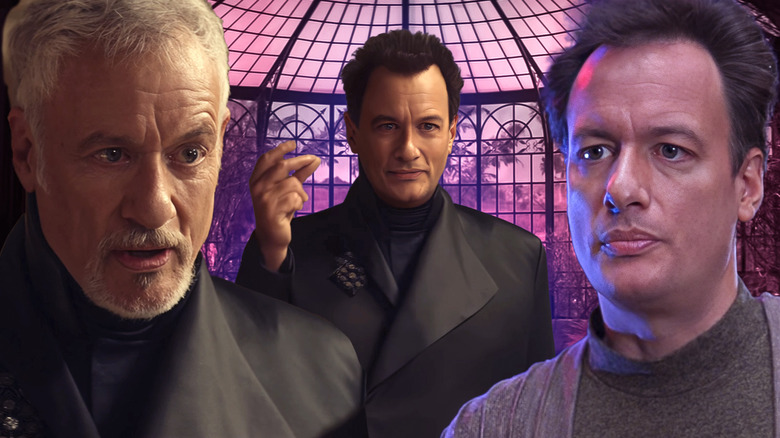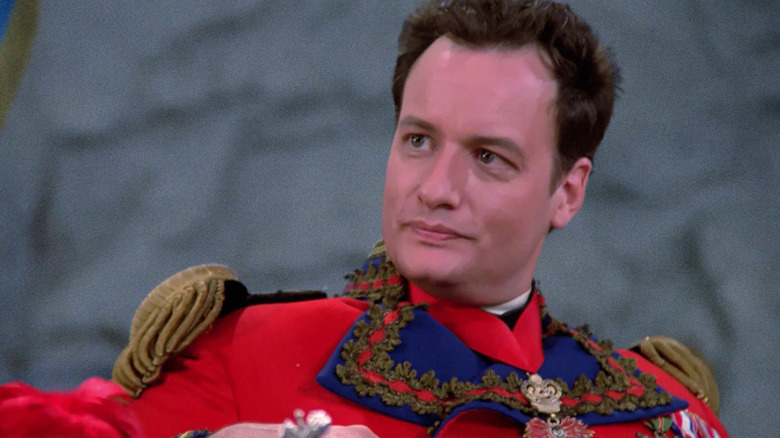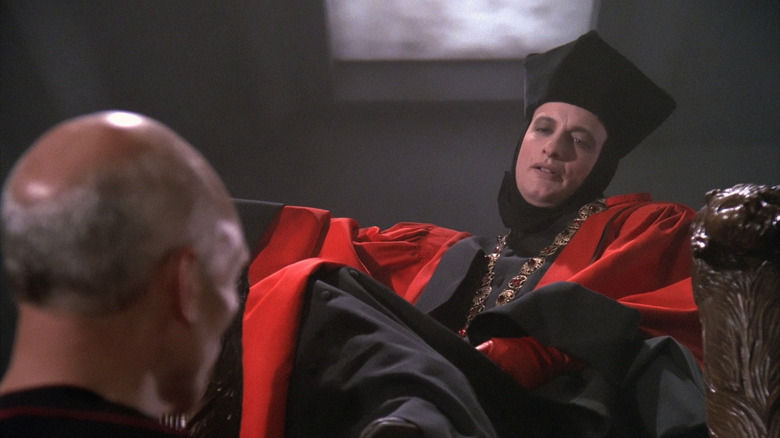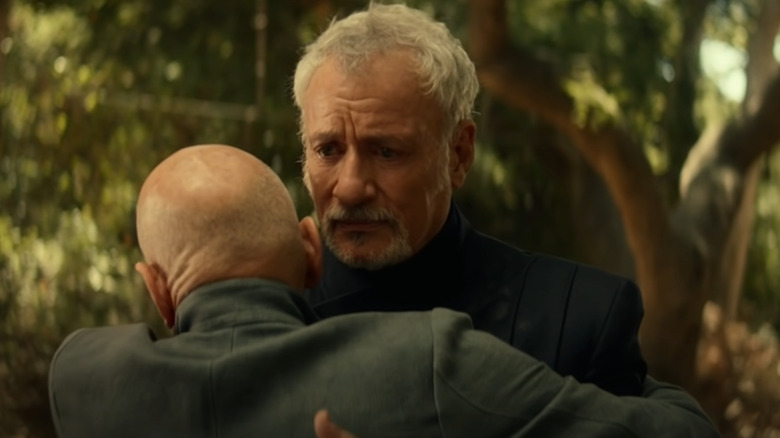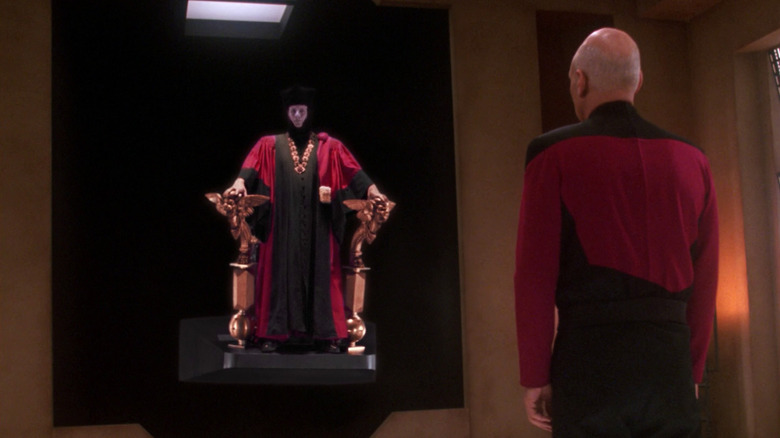Star Trek: Picard Fired Shots At The Legacy Of TNG, But Its Gravest Sin Is The Ruination Of Q
"The trial never ends."
There's a reason that so many gruesome European fairy tales involve a kid who winds up in the forest alone. Forests were gnarly places, and kids were — from a cold, objective perspective — super easy to eat. At some point, someone figured out that youngsters were more likely to stay away from the woods if you told them a story about the pretend dangers of ladies with candy houses than if you just shouted, "Stay in the yard, because I said so."
Jump forward a few hundred years to the 1980s, and "Star Trek: The Next Generation" was positively loaded with monsters as metaphors. In a utopian, post-scarcity world, creator Gene Roddenberry and a laundry list of writers held a mirror up to society — not a normal mirror, a funky one, the kind that's all squinched up in the middle and makes your forehead look like it has a bulky latex appliance glued to it. The Ferengi represented humanity's greed. The Klingons were wrath and pride incarnate. The Borg were every boss, teacher, and stepparent that ever told you how much easier life would be if you just acted more like everyone else. The Tamarians represented the... dangers of letting your DuoLingo subscription lapse, maybe. They weren't all gold.
And then there was Q (John de Lancie), the first member of a non-Federation species that the Enterprise-D would run into on screen, and the perfect, all-encompassing analogy for the dangers that this new crew faced. Across seven seasons, he would define and personify the ethos of "The Next Generation" before bringing it to a poetic, bittersweet, beautiful conclusion.
And then, in just a single season of "Star Trek: Picard," he'd be perplexingly reinterpreted as a living Hallmark card.
Star Trek's Q: A primer
For all of its sins, and they are legion, the "Star Trek: The Next Generation" pilot episode "Encounter at Farpoint" gave one of the best possible unintentional allegories for the show's first season when, not long after taking off, the Enterprise-D hit a literal wall.
Then along came Q, a lifeform equal parts big power and little stinker. Q, it turned out, was the one who constructed the barrier blocking the Enterprise's progress. Humanity, he explained, was "A dangerous savage child race," not nearly impressive enough, well-equipped enough, smart enough, to keep going where we were going. Compared to him, a theatrical enigma with near-omniscience and the ability to quick-change into an outfit made out of deck chair cushions, we were pathetic — kids with toy bows, sneaking into the woods, where we should really know better than to go. He put humanity on trial, through all of history, and frankly, he found us kind of skeevy.
And that's who "Star Trek's" Q was: All of our doubts, dressed in our favorite clothes because he thought it was funny. When you're standing at the precipice of something fantastic, Q is the voice in the back of your head reminding you that you don't deserve it, that there are better people than you who could actually do something with this opportunity. You've already made so many mistakes. Why wouldn't you do it again? He has seen all of your shortcomings, and he's been taking notes. He's the high school cheerleading captain, asking why humanity thinks it has any right to try out for the team when everyone knows full well that we're the ones who keep clogging the toilet in the east hall bathroom.
Q and the never-ending trial of Star Trek's human race
By the end of "Star Trek: The Next Generation," Q had run the Enterprise-D through a gauntlet of sci-fi weirdness, offering a spectrum of misadventures ranging from "introduce the Federation to the greatest threat in the galaxy" to "make the bridge crew play Robin Hood with me" to "steal the captain's girlfriend for the lolz." Through all of the high-concept shenanigans, there was a grave undertone to anyone paying enough attention. Humanity's trial never ended. We were still being watched, and judged, and we always would be. The only way around living in fear that you are not good enough is to be good enough. Impishly, he shepherded Picard (Patrick Stewart) and Starfleet in the direction they needed to go, playing the whole thing like a game, at least by the standards of a zany space god.
In the series finale, "All Good Things," Q admits, not in so many words, that you only teach life lessons to the kids with the potential to learn something from them. He sees that we could be so much more than we already are. "For that one fraction of a second," he tells Picard — referring to the Captain thinking in unique ways to overcome a problem, in a way that no one else considered — "you were open to options you had never considered. That is the exploration that awaits you. Not mapping stars and studying nebulae, but charting the unknown possibilities of existence."
With a winking promise that he'll stop by sometimes, Q is gone from the Captain's life, leaving behind the promise that tomorrow will always be a new adventure, for as long as we keep striving to be better.
Alright, let's talk about that stupid Season 2 of "Star Trek: Picard" now.
Star Trek: Picard and the subtle act of doing Q dirty
In the Season 2 premiere of "Star Trek: Picard," titled "The Star Gazer," Q proclaims that humanity's trial isn't over. Then, later, he messes up history real, real bad to show Picard how mean people could be in a hypothetical world where nastiness is pretty much all we put our time into. Then, he kind of fiddles with history stuff for a while and alludes to having an unspecified deadly Q disease, referred to hereafter as "tuber-Q-losis" (we will not be referring to it hereafter, don't worry).
Then he tells Picard that being alone is scary, and that he was Q's secret favorite the whole time, and that — flying in the face of the current legal discourse in Hollywood — Picard shouldn't be afraid to start dating people who work for him. Then he gets a hug. Then he dies.
Wait, no. First he brings Elnor (Evan Evagora) back from the dead. Audience goodwill is not affected by this decision. Picard starts dating his housekeeper (Orla Brady, who rules) and stops being sad that his mom died.
In a story with seven old-school, 20-plus episode seasons of television and four blockbuster movies to its name, it's hard to find an example of a conclusion that feels unearned. But by golly, Season 2 of "Star Trek: Picard" struck pointless oil like Daniel Plainview on a rich deposit, didn't it? And the destruction of everything Q stood for is the big problem.
Star Trek missed some thematic Qs
The death of Q and the events surrounding it weren't the first time that "Star Trek: Picard" had left fans feeling let down by its characterizations. Some examples were easy to wave away. Picard's sudden affection for Data (Brent Spiner) could be an old man trying to come to terms with the decisions that he made and what it cost him. There was beauty in the idea, if not the execution.
However, to fully forget what Q had always been about was a magnificent bummer. To take the anthropomorphic, theater kid version of your apprehensions, then have it give the main character a hug and tell him how special he is, negates the purpose of Q. He's supposed to bully us. It builds character. It's what taught us to be ready for the Borg, and what saved us from the anti-time anomaly. The "monster as metaphor" stops holding sway when, at the end of the parable, he reminds everyone to smile 20 times a day and that friendship is magic.
What happened to Q was a gigantic drag. He's a classic character, inexorably anchored to some of the most memorable "Star Trek" stories. It would be nice to think that we could just ignore "Star Trek: Picard" and stick to the parts of the story that we like, and we can — of course we can. But bringing back such an unforgettable piece of the franchise's legacy means dredging up already completed stories. It rips the ellipses off and leaves a weird, misplaced period at the end. It invites judgment from the fan base. And unfortunately, the trial never ends.
